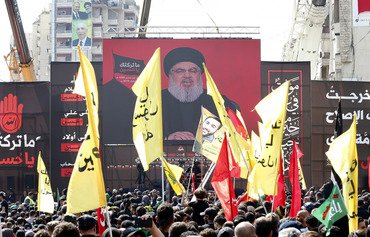Members of a special task force set up to investigate "narco-terrorism" carried out by Iran-backed Hizbullah arrived in Beirut on Saturday (January 13th) to begin their work, according to various media reports.
Established last week by the US Department of Justice, the team aims to collect information on the international narcotics networks Hizbullah uses to finance its operations, inside Lebanon and elsewhere.
The Hizbullah Financing and Narcoterrorism Team (HFNT) intends to map these networks, which extend across Africa and into Central and South America.
The team, which comprises specialists on money-laundering, drug trafficking, terrorism and organised crime, will submit a report on its findings to the US Department of Justice, so the appropriate actions can be taken.
Hizbullah's financial activity
Hizbullah has long been the target of US sanctions, and its financial activity continues to draw scrutiny.
A US executive order issued in 2007 took aim at the militia's operatives, authorising the seizure of assets of "individuals undermining the sovereignty of Lebanon".
In 2011, the US launched a crackdown on Hizbullah’s partners, and designated the Beirut-based Lebanese Canadian Bank as "a primary money-laundering concern".
"Some say Hizbullah secures part of its income in Lebanon from the black economy," said Lebanese Forces media officer Charles Jabbour. "Although this is yet to be proved, there is information circulated on more than one level."
In pursuing its investigation, the US judiciary will act "based on information, proofs and evidence, and not out of grudges, retaliation or settlement of scores", Jabbour told Al-Mashareq.
"What is happening now is that there is no more turning a blind eye to Hizbullah," he explained. "Rather, there are judicial actions related to the role of Hizbullah in drug trafficking and the financing it secures."
'A message to Iran'
The crackdown on Hizbullah's international financing network also sends a strong message to Iran, Jabbour said.
"This clearly shows a will in Washington to besiege all the arms of Iran in the region, specifically Hizbullah, on more than one level -- security, military and financial -- as well as the group’s actions overseas," he said.
"In this context, there is a major decision to besiege Hizbullah, both on the international and Arab levels, because of its policies," he added.
"In the meantime, Iran is sent a message: to keep away from its role in the region, as it is no longer allowed to continue to undermine the region’s stability and endanger regional peace," he said.
"Therefore, Iran has either to contribute to stability or bear the consequences of its policies in the region and its creation of dual statelets and militias," he added.
Prosecuting individuals and networks
“HFNT is tasked with investigating individuals and networks providing support to Hizbullah and pursuing prosecutions against them,” the US Department of Justice said in a statement.
The US Department of Treasury and the US Drug Enforcement Administration (DEA) have previously conducted major operations targeting drug traffickers in Columbia and Panama who ship tonnes of cocaine around the world.
They found the network had laundered billions of dollars of its money and that of other traffickers through companies in Panama and via banks in Lebanon and elsewhere, and by exporting used cars from the US to be sold in West Africa.
According to former DEA official Derek Maltz, Hizbullah recently used those funds to purchase weapons for its operations in Syria, AFP reported.
Some of the funds also have reached Yemen, he said, where they are being used to support the Houthis (Ansarallah).

![Members of Lebanon's Hizbullah wave the group's flag as others carry the coffin of Mustafa Badreddine, a top Hizbullah commander killed in Syria, during his funeral in southern Beirut on May 13th, 2016. A US Department of Justice team arrived in Beirut on Saturday (January 13th) to investigate the militia's financial networks. [STRINGER/AFP]](/cnmi_am/images/2018/01/16/11098-Lebanon-Hizbullah-funeral-600_384.jpg)





